mobile Ansicht, to the English Version tap the flag


- Republik Serbien
- palamentarische Demokratie
- Eigenbezeichnung: Republika Srbija
• Flaggen
• historische Flaggen
• regionale Flaggen
– Kosovo
– Wojwodina
• Bedeutung/Ursprung der Flagge
• Wappen
• historische Wappen
• Bedeutung/Ursprung des Wappens
• Flugzeugkokarde
• Landkarte
• Zahlen und Fakten
• Geschichte
• Ursprung des Landesnamens
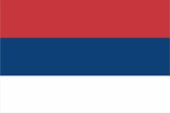
seit 2010,
National- und Handelsflagge,
Seitenverhältnis = 2:3,
Quelle, nach: Wikipedia (D)



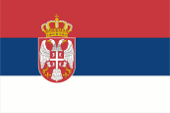
seit 2010,
Staatsflagge,
Seitenverhältnis = 2:3,
Quelle, nach: Wikipedia (D)





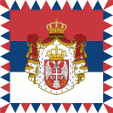
seit 2010,
Flagge (Standarte) des Präsidenten,
Seitenverhältnis = 1:1,
Quelle, nach: Flags of the World




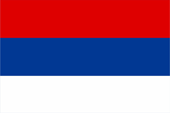
1835–1882,
National- und Staatsflagge des Fürstentums Serbien,
Seitenverhältnis = 2:3,
Quelle, nach: Wikipedia (D)



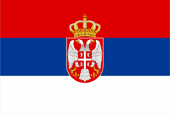
1882–1918,
National- und Handelsflagge des Königreichs Serbien,
Seitenverhältnis = 2:3,
Quelle, nach: Wikipedia (IT)



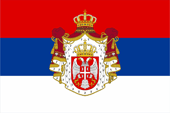
1882–1918,
Staatsflagge des Königreichs Serbien,
Seitenverhältnis = 2:3,
Quelle, nach: Flags of the World



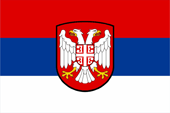
1941–1944,
National- und Staatsflagge von Serbien,
Seitenverhältnis = 2:3,
Quelle, nach: Wikipedia (D)



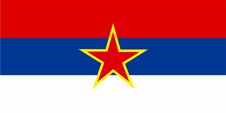
1947–1992,
Flagge Serbiens innerhalb des sozialistischen Jugoslawiens,
Seitenverhältnis = 1:2,
Quelle, nach: World Statesmen



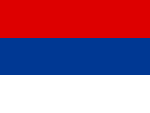
1992–2004,
Nationalflagge,
Seitenverhältnis = 1:2,
Quelle, nach: Flags of all Nations




2004–2010,
National- und Handelsflagge,
Seitenverhältnis = 2:3,
Quelle, nach: Wikipedia (D)



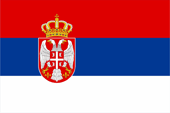
2004–2010,
Staatsflagge,
Seitenverhältnis = 2:3,
Quelle, nach: Wikipedia (D)






Bedeutung/Ursprung der Flagge
Die Flagge Serbiens zeigt die Farben Rot, Blau und Weiß in waagerechter Anordnung. Die heutige Ausführung der Flagge (mit Wappen und Krone) wurde am 17.08.2004 eingeführt. Bis 2010 folgte Serbien farblich den Farbvorgaben und Farbdefinitionen von Jugoslawien, die in etwa diesen Pantone Farbwerten entsprechen: Blau = pt 288, Rot = pt 1795, Gelb = pt 116. Mit der am 11.11.2010 verabschiedeten "Verordnung über die Festlegung der Darstellung der größeren und kleineren Wappen und der Flagge sowie der Partitur der Hymne" wurden die Farben neu standardisiert. Die im Gesetz gegebenen Farbmischvorgaben entsprechen in etwa diesen Werten: Blau = pt 541, Rot = pt 192, Gelb = pt 123, Purpur = 704.
Serbien hatte 1830 das osmanische Joch abgeworfen, und im Jahre 1835 die rot-blau-weiße Flagge angenommen. Über den Ursprung der Farbkombination ist nichts bekannt. Einerseits war dem Mittelalter eine rot-blaue Flagge Serbiens überliefert, die 1835 durch einen weißen Streifen ergänzt wurde, andererseits könnten die Farben Russlands Modell gestanden haben. Die Farben könnten als Dank für die Waffenhilfe der Russen für die Serben im Freiheitskampf gegen die Türken angenommen worden sein. Viele slawische Völker schufen sich in der Zeit nach 1848 (dem Jahr der Revolutionen) – im Zusammenhang mit einem erstarkenden slawischen Nationalismus – eigene Flaggen. Dabei spielte der Panslawismus eine bedeutende Rolle, eine politische Bewegung des 18./19. Jahrhunderts, die alle Slawen in einer Nation einen wollte. Die meisten slawischen Völker lebten jedoch in dieser Zeit unter österreichischer, türkischer oder auch deutscher Herrschaft. Der Panslawismus sah in Russland ein Vorbild, denn die Russen waren, neben Serbien und Montenegro, die einzige freie slawische Nation. Und so wurden die Farben der russischen Flagge zum Idol der Panslawisten, und letztlich farbliches Vorbild bei der Gestaltung der Flaggen vieler slawischer Nationen. Diese Flaggen trugen und tragen bis auf wenige Ausnahmen die russischen Farben Weiß, Blau und Rot als gemeinsames Merkmal. Daher wird diese Farbkombination "Panslawische Farben" genannt.
In der 1945 durch Tito proklamierten Föderativen Volksrepublik Jugoslawien konnten die südslawischen Nationen in ihren Republiken ihre Nationalfarben (meist Kombinationen der Panslawischen Farben) wieder auf eigenen Flaggen verwenden. Jedoch musste, wegen dem politischen System, ein roter Stern in der Mitte der Flagge verwendet werden. Mit dem Zusammenbruch des sozialistischen Systems verließen zwischen 1991 und 1992 Slowenien, Kroatien, Makedonien und Bosnien-Herzegowina den jugoslawischen Staat. Im April 1992 schlossen sich die beiden verbleibenden Staaten Serbien und Montenegro zur "Föderativen Republik Jugoslawien" zusammen, und am 27.04.1992 wurde der rote Stern ersatzlos von der Nationalflagge entfernt. Die beiden verbleibenden Mitgliedsstaaten verwendeten innerhalb des neuen Jugoslawiens gleiche Flaggen in rot-blau-weiß. Zur Unterscheidung wurde die Flagge Montenegros im Format 1:3 dargestellt. Im Jahre 2004 wurde dann die heutige Flagge Serbiens eingeführt, "Jugoslawien" hieß inzwischen "Bundesrepublik Serbien und Montenegro". Die Föderation wurde dann 2006 aufgelöst.
Quelle:
Die Welt der Flaggen,
Flaggen und Wappen der Welt,
Wikipedia (EN),
Flags of the World,
Volker Preuß


seit 2004,
Wappen von Serbien,
Quelle: Wikipedia (EN)


bis 1918,
Wappen des Königreichs Serbien,
Quelle: Wikipedia (EN)

1941–1944,
Wappen von Serbien,
Quelle: Wikipedia (EN)

1947–2004,
Wappen von Serbien,
Quelle: R-41, Public domain, via Wikimedia Commons

Das Wappen Serbiens stammt in seiner heutigen Form aus dem 19. Jahrhundert, seine Wurzeln hat es jedoch im frühen Mittelalter. Der Doppeladler geht jedoch auf das Byzantinische Reich zurück. Die im 8./9. Jahrhundert gegründeten serbischen Staaten Zeta und Raschka (Raszien) waren Lehen des Byzantinische Reichs, die 1117 zum Fürstentum Serbien zusammengefasst wurden. Erst im Jahre 1180 wurde Serbien von Byzanz unabhängig. Mit dem Zusammenbruch des Byzantinischen Reichs ging die Aufgabe des Schutzes Europas – die Abwehr der türkischen Horden – auf Serbien über. Auch in der Religion setzte man das christlich-orthodoxe Erbe von Byzanz fort, wenn auch als Serbische Landeskirche. So ist es kein Zufall, das die serbische Heraldik mit dem Doppeladler an die Heraldik des Byzantinischen Reichs erinnert. Dieser Doppeladler trägt ein rotes Brustschild mit einem weißen Kreuz. In den Ecken des Kreuzes je ein Feuerstahl. Dieses Brustschild is ebenfalls ein sehr altes serbisches Symbol. Es geht auf das letzte byzantinische Herrschergeschlecht, die Paläologen (Palaiologen) zurück. Sie regierten in Byzanz von 1258 bis 1453. Die beiden goldenen Lilien unterhalb der Fänge des Adlers sollen wahrscheinlich für die Dynastien der Familien Obrenovic und Karadjordjevic stehen, die Serbien nahezu abwechselnd als Könige regierten. Ebenso könnten die Lilien für die historischen Fürstentumer Zeta und Raschka stehen, aus denen das heutige Serbien hervorgegangen ist. Als die Könige Serbiens im Jahre 1918 auch die Könige des "Königreichs der Serben, Kroaten und Slowenen" (Jugoslawien) wurden, hat des serbische Wappen für das Wappen dieses Königreichs Modell gestanden. Im sozialistischen Jugoslawien (1946–1992) wurde ein neues, mit kommunistischer Symbolik ausgestattetes Landeswappen angenommen. Das alte Wappen wurde von der Flagge verbannt, und durch den fünfzackigen, goldumrandeten roten Stern der Tito-Partisanen, dem Zeichen des Kommunismus ersetzt. Das kommunistische Wappen blieb offiziell noch bis 2004 in Kraft.
Quelle: Wikipedia (EN), Volker Preuß


Flugzeugkokarde,
Quelle, nach: Wikipedia (EN)

Lage:
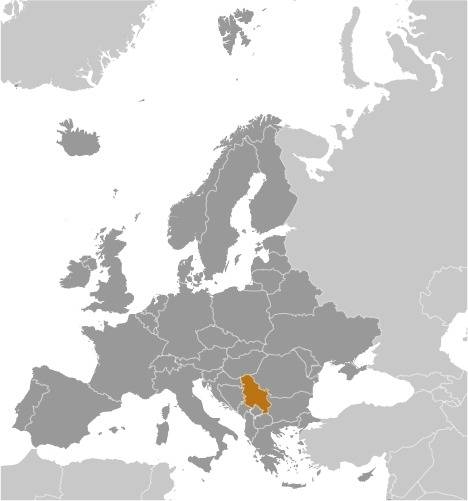
Quelle: CIA World Factbook
Landkarte des Landes:
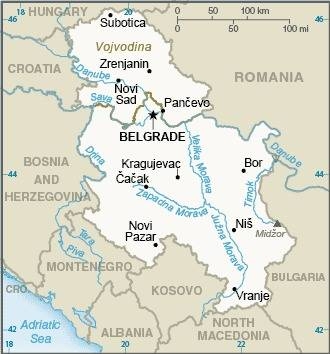
Quelle: CIA World Factbook
Die Staaten des früheren Jugoslawien:
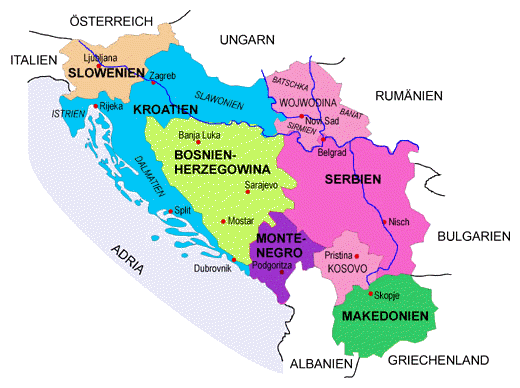
Landkarte/Map: Volker Preuß

Fläche: 88.36 km²
Einwohner: 6.900.000 (2020), meist Serben
Religionen: meist Serbisch-Orthodoxe Christen
Bevölkerungsdichte: 78 Ew./km²
Hauptstadt: Beograd (deutsch: Belgrad), 1.344.844 Ew. (2016)
Amtssprache: Serbisch/Serbokroatisch
sonstige Sprachen: Albanisch, Ungarisch
Währung: 1 Serbischer Dinar (RSD, Din.) = 100 Para
Zeitzone: MEZ
Quelle: Wikipedia (DE)

Antike · Besiedelung durch thrakische und illyrische Stämme
33–29 v.Chr. · römische Eroberung
395 · bei der Teilung des Römischen Reiches kommt das heutige Serbien an das Oströmische Reich (Byzanz)
6./7. Jahrhundert · Einwanderung der Serben, Entstehung der serbischen Fürstentümer Zeta, Bosnien und Raschka (Raszien) als byzantinische Lehen
1040 · Zeta macht sich von Byzanz unabhängig
1077 · Zeta wird Königreich
1090 · Zeta vereinigt Bosnien und Raschka unter seiner Führung
1138 · Zeta verliert Bosnien und Raschka wieder
1168 · Raschka wird wieder byzantinisches Lehen
1180 · Raschka wird von Byzanz unabhängig
1183 · Raschka übernimmt die Macht in Zeta
1217 · Raschka wird zum Königreich Serbien erhoben
13./14. Jahrhundert · Serbien erobert Makedonien und Bosnien, Epirus, Thessalien und Albanien
1346 · Stephan Dusan wird zum "Kaiser der Serben und Griechen" gekrönt
1355 · Tod von Kaiser Stephan, das Großserbische Reich zerfällt in Einzelstaaten
1371 · die Türken schlagen die Serben an der Maritza
1389 · die Türken schlagen die Serben auf dem Amselfeld, Serbien wird tributpflichtig, Zeta (ab 1500 Montenegro genannt) kann seine Unabhängigkeit bewahren
1459 · Serbien wird Teil des Osmanischen Reiches
1718–1739 · der Norden Serbiens gehört zu Österreich
1804 · Volksaufstand unter Führung von G. Karadjordjes
1812 · Frieden von Bukarest, Gewährung von Autonomie für Serbien
1814 · das Osmanische Reich besetzt Serbien erneut
1815 · Volksaufstand unter Führung von Milos Obrenovic
1816 · Teilautonomie für Serbien mit Serbisch-Türkischer Verwaltung
1817 · Milos Obrenovic wird Fürst von Serbien
1830 · Serbien wird vom Osmanischen Reich unabhängig
1835 · ein großer Teil der türkischen Truppen verlässt Serbien, Ende der türkischen Verwaltung
1839 · Milos Obrenovic dankt ab, Thronfolger wird Michael III. Obrenovic
1842 · Michael III. Obrenovic muss abdanken, Thronfolger wird Alexander Karadjordjevic, der Sohn von G. Karadjordjes
1858 · Sturz von Alexander Karadjordjevic, Thronfolger wird Milos Obrenovic
1860 · Milos Obrenovic dankt ab, Thronfolger wird Michael III. Obrenovic
1867 · die letzten türkischen Truppen verlassen das Land
1868 · Ermordung von Michael III. Obrenovic, Thronfolger wird Milan I. Obrenovic
1869 · Einführung einer Verfassung
1877 · Serbien beteiligt sich am russisch-türkischen Krieg
1878 · Berliner Kongress, Serbien erhält die türkischen Gebiete südlich von Nisch
1882 · Milan I. Obrenovic wird zum König gekrönt, betreibt pro-österreichische Politik
1885 · Krieg gegen Bulgarien
1889 · Milan I. Obrenovic dankt ab, Thronfolger wird Alexander I. Obrenovic
1903 · Ermordung von Alexander I. Obrenovic, Thronfolger wird Peter I. Karadjordjevic, betreibt pro-russische, panslawische und anti-österreichische Politik
1912–1913 · Balkankriege, Serbien gewinnt Kosovo und Nordmakedonien
28.06.1914 · der österreichische Thronfolger Erzherzog Franz Ferdinand wird in Sarajevo von dem Serben und Mitglied des serbischen Geheimbunds "Schwarze Hand" Gavrilo Princip ermordet
28.07.1914 · Österreich-Ungarn erklärt Serbien den Krieg
01.08.1914 · Russland (im Bündnis mit Serbien) erklärt Österreich-Ungarn den Krieg, das Deutsche Reich (im Bündnis mit Österreich - Mittelmächte) erklärt Russland den Krieg
03.08.1914 · Frankreich (im Bündnis mit Russland - Entente) erklärt dem Deutschen Reich den Krieg
04.08.1914 · Großbritannien (im Bündnis mit Frankreich und Russland - Entente) erklärt dem Deutschen Reich den Krieg
02.10.1914 · das Osmanische Reich tritt auf Seiten der Mittelmächte in den Ersten Weltkrieg ein
14.10.1915 · Bulgarien tritt auf Seiten der Mittelmächte in den Ersten Weltkrieg ein
Dezember 1915 · ganz Serbien ist von österreichischen und bulgarischen Truppen besetzt
Oktober/November 1918 · Gegenoffensive der Entente, die Truppen der Mittelmächte räumen Serbien, Serbien forciert die Einigung der südslawischen Völker unter seiner Krone im Staat "Königreich der Serben, Kroaten und Slowenen", das 1929 in Jugoslawien umbenannt wurde
1941 · Jugoslawien wird im Verlauf des Zweiten Weltkriegs aufgelöst, Serbien kommt unter deutsche Militärverwaltung
1941–1946 · Jugoslawien ist während des Zweiten Weltkriegs Schauplatz eines erbarmungslosen Partisanen- und Bürgerkriegs zwischen Kommunisten (unter J.P.Tito), Republikanern, Monarchisten und Nationalisten, die Kommunisten setzen sich durch
29.11.1945 · Ausrufung der "Föderativen Volksrepublik Jugoslawien" durch Tito
31.01.1946 · Ausrufung der Volksrepublik Serbien (innerhalb des kommunistischen Jugoslawiens)
07.04.1963 · Ausrufung der Sozialistischen Republik Serbien (innerhalb des kommunistischen Jugoslawiens)
28.09.1990 · Ausrufung der Republik Serbien (innerhalb Jugoslawiens)
1991–1992 · Jugoslawien löst sich in seine Einzelstaaten auf
27.04.1992 · Serbien und Montenegro proklamieren die „Bundesrepublik Jugoslawien”
1991–1995 · Krieg zwischen Jugoslawien und Kroatien/Bosnien-Herzegowina
1998 · im Kosovo forciert die UÇK (Albanische Befreiungsarme des Kosovo) ihren Kampf für die staaliche Unabhängigkeit des Kosovo, auf Grund der serbischen Gegenmaßnahmen fliehen viele Albaner aus Kosovo
1999 · die NATO ergreift einseitig Partei für die UÇK, greift in der Krieg Serbiens um seine territoriale Integrität ein, und bombardiert großangelegt serbische Ziele im Kosovo sowie in Serbien selbst, Besetzung des Kosovo durch KFOR-Truppen der NATO zum "Schutz vor Übergriffen jugoslawischer Truppen", Vertreibung der serbischen Bevölkerung aus dem Kosovo
2000 · Wahlen in Serbien, Vojislav Kostunica wird Nachfolger von Milosevics
28.06.2001 · die serbische Regierung verkauft Slobodan Milosevic gegen Wirtschaftshilfe und mehrere Millionen Dollar an das UN-Kriegsverbrechertribunal in Den Haag
2002 · die serbische Provinz Kosovo wählt einen "Präsidenten", Ibrahim Rugova
04.02.2003 · neue Verfassung, Jugoslawien wird durch die Bundesrepublik Serbien und Montenegro abgelöst
21.05.2006 · Volksabstimmung in Montenegro über eine Trennung von Serbien, 55,4% Zustimmung
13.07.2006 · Unabhängigkeitserklärung von Montenegro
Oktober 2006 · neue Verfassung
Source: Atlas zur Geschichte,
Wikipedia (D),
World Statesmen

Der Name "Serbien" geht auf das Volk der Serben zurück, in dessen Sprache das Wort "srb" mit "Volk" zu übersetzen ist. Serbien ist das "Volksland".
Source:
Atlas der wahren Namen


![]()







































